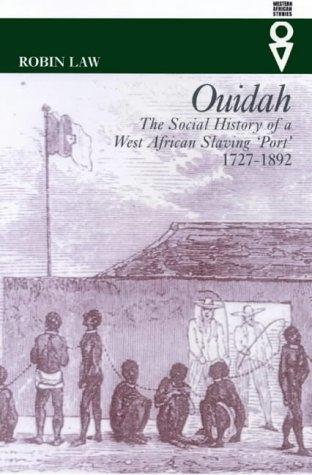'This work is a masterful chronological history of a community, especially the history of its merchant families. Although grounded in archival research, the book's collection of oral traditions from descendants of the Ouidah merchants makes this study of an urban community unique. Especially important is the history of the "Brazilians" among them, because many of these merchants were ex-slaves themselves and Portuguese was the lingua franca.' RT Brown in Choice, Middletown CT. June 2006. 'Ouidah offers a great deal more than just a case study of slave traffic. Professor Law examines the town from the inside out, and from its obscure Hueda origins to its occupation by the French in 1892 via its long incorporation into the kingdom of Dahomey. Slaving features as a staple of the local economy - the merchants and officials of Ouidah served as middlemen in the sale of slaves taken elsewhere - and is a recurring theme, but the character of the town and its inhabitants are also dealt with at length. Of course, they are inextricably linked. 'Professor Law excels in reconstructing the topography, society and administrative history of Ouidah under successive regimes and relating these structures to the conduct of external trade, both for slaves and, latterly, for palm oil.' Richard Gorski in History, June 2006. 'This book is an excellent case study on the formation, growth and decline of Ouidah's Atlantic merchant community and of the town itself. '...this is a very informative book. It provides a detailed analysis of the formation and growth of Ouidah's trade community and its relations with Dahomey in the era of Atlantic commerce.' Ibrahima Thiaw in the International Review of Social History Vol 51 (2006). 'Robin Law's social history of Ouidah during the period of Dahomian overrule represents a major milestone in the historiography of the so-called Slave Coast. Picking up from where he left off in The Slave Coast of West Africa, 1550-1750 (Oxford, 1991) and drawing on the remarkable range of articles on the economic, social and political history of the region he has published over the last three decades, Law has fashioned what will surely become the definitive account of West Africa's most important slaving 'port'. '...an important book, one that will hopefully inspire others to explore further the history of this most fascinating West African town and to continue its story into the twentieth century.' John Parker, School of Oriental and African Studies, University of London. 'Ouidah is a well-documented and interesting case study of one of one of the most important West African slave trading centres in early modern history.' Henk den Heijer in International Journal of Maritime History. 'Law has produced a valuable history of one West African port and has pushed forward a small but important direction in increasing our understanding of West Africa's place in the Atlantic World. By narrowing our focus in West Africa beyond general coastal regions, we can not only better understand the diversity of peoples, states, societies, and cultures that existed, but also the diversity of continuity and change that occurred from participation in the Atlantic World.' - H-Net Reviews.












